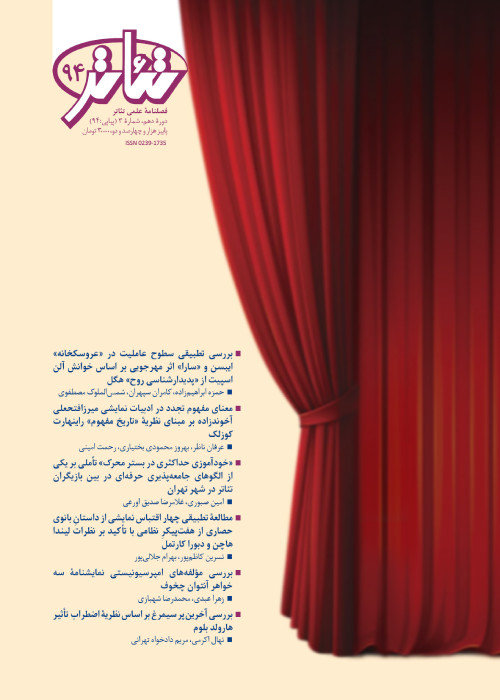Distancing in Taziyeh as a Function of Thinking about the Event
Distancing or alienation that forms the basis of epic theater is actually using actions or reactions by the actors or the crew that are done deliberately to prevent the audience from identifying with the characters of the story and emotionally being engaged in events and divert their beliefs from the reality of what they watch on stage. This is done with this aim that the viewers are not losing their awareness of the current situation and putting them through thinking and reasoning about the hidden message of the play. But Is distancing with such an approach and goal used in Taziyeh? Isn’t the audience supposed to identify with the epic characters in Taziyeh? Is the sacred distance of the epic characters in Taziyeh with the audience an obstacle for identification? There is a basic difference between distancing in Taziyeh and distancing in epic theater. Like the epic theater actors, Taziyeh actors never equate themselves with the roles. But the main point which distinguishes this type of distancing with the Brechtian one is the difference in the aim and meaning of the form. In fact, Brecht uses this alienation for diverting the audiences’ emotion and to awaken their mind and judgment, but Taziyeh has nothing to do with Brecht-type rationality, and as it focuses on rational thought and concepts, it seeks to arouse emotions as well. Alienation in Taziyeh occurs only because Taziyeh performers never consider themselves that qualified and worthy for the role of saints _ protagonists_, and if they get the villains _the antagonists_ roles, they believe they are eternally cursed. In fact, the alienation and distancing of the performer with the role similar to the role is completely rooted in religion. While the alienation of epic theatre is rational and revolutionary. Distancing is one of the reasons for Taziyeh attractiveness and it causes the expansion and permanence of this national and religious play among people. Unlike West theater, Taziyeh subject is not from the real life and ordinary people, but the themes and characters do not allow the writer, director and performers to think of making the play seem real and natural; So that in Taziyeh, the distance between Karbala event and what is shown, and the distance between the roles _Imams and the Infallibles_ and the performers is always clear. But what causes this separation and distance in Taziyeh is the religious belief of the writer, director, performer and in general all the involved people.
- حق عضویت دریافتی صرف حمایت از نشریات عضو و نگهداری، تکمیل و توسعه مگیران میشود.
- پرداخت حق اشتراک و دانلود مقالات اجازه بازنشر آن در سایر رسانههای چاپی و دیجیتال را به کاربر نمیدهد.


